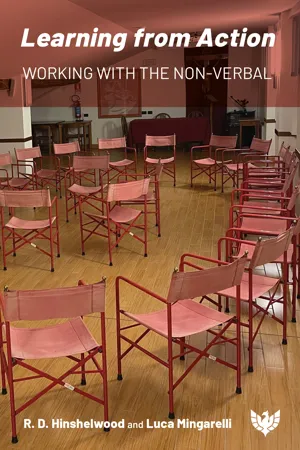
Learning from Action
Working with the Non-verbal
- 328 pages
- English
- ePUB (mobile friendly)
- Available on iOS & Android
Learning from Action
Working with the Non-verbal
About this book
Since the early 1990s, Enrico Pedriali with R. D. Hinshelwood organised workshops in Italy known as the learning from action workshops. This novel approach evolved from applying the principles of therapeutic communities to a group relations form of experiential conference. The group relation tradition, however, does not focus particularly on mental health organisations and tends to focus on senior management issues of leadership and authority. In contrast, the learning from action workshops are tailored to the care workers engaged in the direct work, in particular for those working with clients and patients with significant problems with verbal and symbolic communication. The workshops also include an element of research into the unconscious messaging systems employed in making relations, which contribute to therapeutic and other mental health care services. There are also chapters on a related form of workshop – the living and learning experience – which was established primarily for learning about therapeutic communities, which bring further insight to working practices.
The book brings together a community of 21 authors: Giada Boletti, Louisa Diana Brunner, Davide Catullo, Heather Churchill, John Diamond Donna M. Elmendorf, Giovanni Foresti, Rex Haigh, R. D. Hinshelwood, Yuko Kawai, Eriko Koga, Jan Lees, Simona Masnata, Luca Mingarelli, Gilad Ovadia, Mario Perini, Barbara Rawlings, Antonio Sama, Edward R. Shapiro, Lili Valkó, and Zsolt Zalka.
It will be a must-read for those working in mental health care. The information within will be of use to those new to the profession, for whom there is often very little preparation or reading material, and also to more senior members to use not only for their own development but also in training and research activities in mental health.
Tools to learn more effectively

Saving Books

Keyword Search

Annotating Text

Listen to it instead
Information
Table of contents
- Cover Page
- Half Title
- Full Title
- Copyright
- Dedication
- Contents
- Acknowledgements
- Our community of twenty-one authors
- Foreword
- Introduction
- Chapter 1: Applying group relations to therapeutic communities: a marriage with offspring
- Chapter 2: Deciding for surviving: ideas and models in group relations conference traditions
- Chapter 3: Language in action: the other side of group relations
- Chapter 4: The early intentions
- Chapter 5: The LfA programme and its reasoning
- Chapter 6: Snapshots of the process
- Chapter 7: Reflections on behaviour and relations as meaningful: feel the impact
- Chapter 8: A journey called Learning from Action: from a participant’s point of view
- Chapter 9: The roles of a consultant during decision-making and activities groups (DAG)
- Chapter 10: Comments from other approaches: living–learning experience (LLE) workshops in theory
- Chapter 11: Living–learning experience workshops in practice
- Chapter 12: Learning from Action: a description and evaluation of an experiential learning workshop
- Chapter 13: Facilitating the learning, and taking the learning home
- Chapter 14: Developments and later conceptualisations
- Chapter 15: Understanding community dramaturgy in everyday life and how LfA can promote it
- Chapter 16: Cultural dimensions: LfA-Japan—European flavour and Japanese taste
- Chapter 17: Embodied belonging: the importance of rhythm and reciprocity in building community
- Afterword: Leaving our conclusions open
- Appendix 1: Initial correspondence
- Appendix 2: Sample programmes (2001, 2005, 2012, 2019)
- References
- Index
Frequently asked questions
- Essential is ideal for learners and professionals who enjoy exploring a wide range of subjects. Access the Essential Library with 800,000+ trusted titles and best-sellers across business, personal growth, and the humanities. Includes unlimited reading time and Standard Read Aloud voice.
- Complete: Perfect for advanced learners and researchers needing full, unrestricted access. Unlock 1.4M+ books across hundreds of subjects, including academic and specialized titles. The Complete Plan also includes advanced features like Premium Read Aloud and Research Assistant.
Please note we cannot support devices running on iOS 13 and Android 7 or earlier. Learn more about using the app